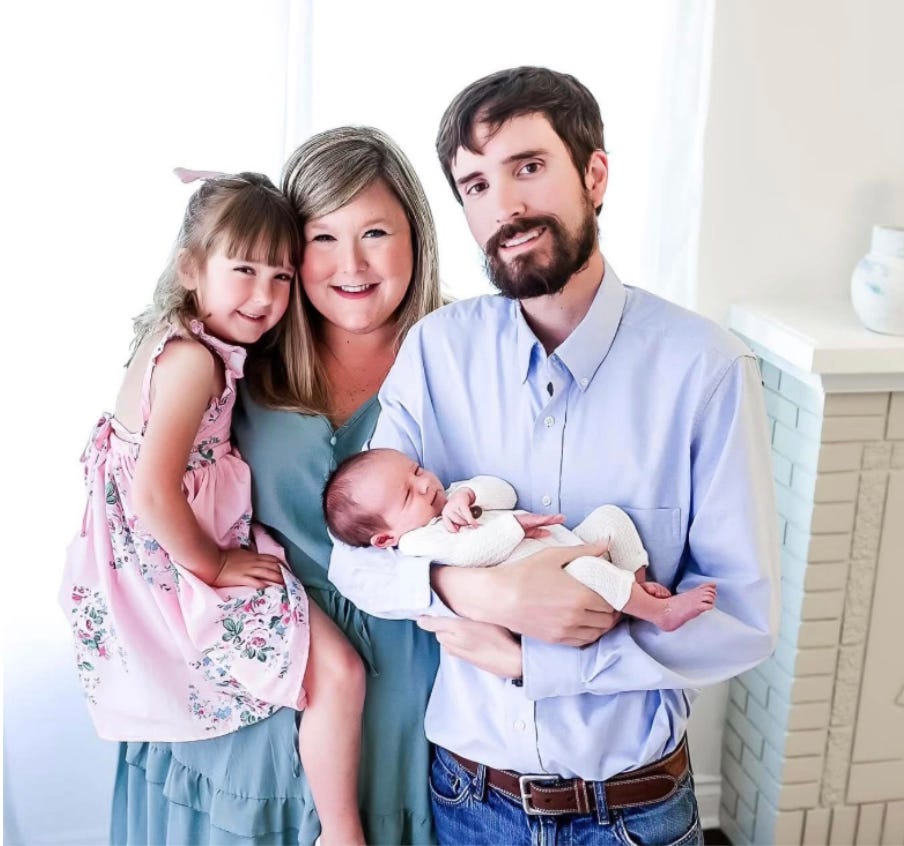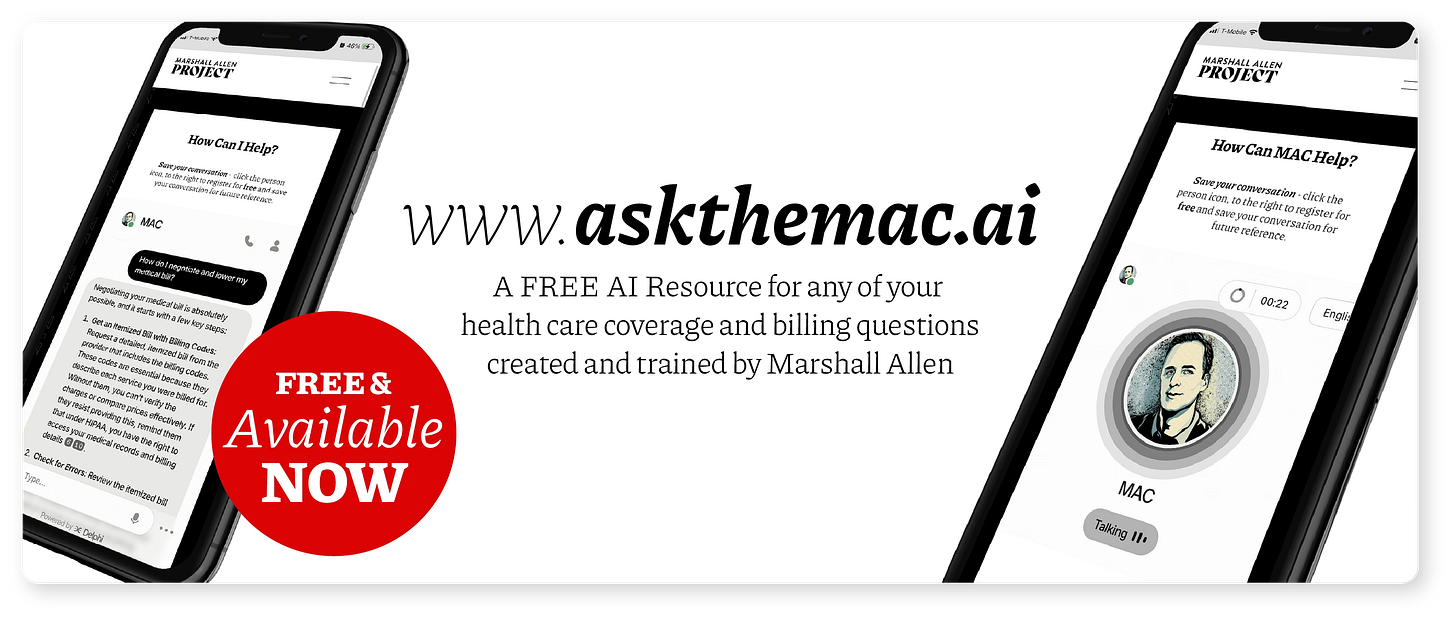Hospital’s Unjust Enrichment Takes Advantage of a Sick Mother
Chris & Rebecca Kerr challenged payments they had made for a multi-day hospital stay and ended up recouping all of it, saving $1,040.

All of a sudden, she was struggling to breathe. After recovering from the flu a few days earlier, Rebecca Kerr came down with another high fever. But this time it was different; She had shortness of breath that would appear after walking across the room. A look down at the health stats on her Apple watch confirmed that something wasn’t right.
Rebecca’s husband, Chris, immediately took her to the emergency room. “When we arrived at the ER there was no waiting. Once we went to triage, they took us back immediately and there were people in and out of the room. It was just chaos,” Chris shared, as he recounted the severity of the situation.
The situation was much different than any other ER visit the couple had ever experienced. Prior to this, any time they visited the ER it wasn’t for a life-threatening situation, so they were accustomed to wait times.
Rebecca is a third-grade elementary school teacher. Originally from South Carolina, she and Chris moved to Norman, Oklahoma 13 years ago, where they live with their five-year-old daughter and one-year-old son.
The ER visit to Norman Regional Health System resulted in a two-day inpatient hospital stay. It turns out that Rebecca contracted pneumonia from the flu. Due to her reduced oxygen levels, she needed to be admitted, monitored, and kept on oxygen. The series of events occurred back in December of 2022 when COVID restrictions were being lifted, which led to respiratory illnesses running rampant. In August of that year, their daughter contracted COVID on her first day of preschool resulting in the entire family falling sick with the virus.
“We caught every single virus you can think of between August and December [2022],” Chris recalled.
After a few days being monitored in the hospital and receiving treatment with antibiotics, Rebecca made a full recovery. A victory that is worth highlighting independent of the billing battle we are about to embark on.
It took more than six months for the family to receive a bill in the mail. At first glance, Chris noticed that it wasn’t itemized, the numbers didn’t make sense, and he was being asked to pay $2,100.
After being diagnosed with Multiple Sclerosis (MS) almost 13 years ago, he is no stranger to navigating the healthcare system. When recalling this billing experience he shared, “This wasn’t my first run in with the healthcare and insurance world. I have to deal with it all the time. Every year my medication renews, they have to perform another prior authorization.”
Chris works as a research meteorologist at the University of Oklahoma in partnership with the National Oceanic and Atmospheric Administration (NOAA) federal laboratory. Chris doesn’t work in healthcare, but he has the knowledge and experience of someone who does.
The numbers on the bill just didn’t add up. Rebecca’s hospital bill had total charges of $20,038.04. That might not shock you for a multiple day hospital stay, but this will….
Her insurance plan paid $21,706.64.
That is $1,668.60 more than what Norman Regional billed Rebecca.
And the hospital came to collect $2,300 of co-insurance from the family after acknowledging this overpayment.
This is a lot to track, so I made a short list to allow for an easier read:
$20,038.04 – Billed Charges
$24,006.90 – Allowed Amount
$21,706.64 – Insurance Plan Paid
$2,300.26 – Coinsurance Due
$200 – Copay Paid Up-Front at ER
$2,100.26 – Coinsurance Due (minus the $200 ER copay payment considered upfront)
The next question many of us would ask is how it’s possible for the allowed amount - otherwise known as the agreed upon rate between the insurance company and healthcare provider - to be greater than billed charges. In this case, the allowed amount was $3,968.86 higher than billed charges. These occurrences are sometimes referred to as “upside down claims.” I called an insurance company to understand how a health plan could pay more than the hospital’s billed charges; I was told that it’s all based on contractual nuances between insurance companies and healthcare providers.
What health plan paid more than billed charges in this occurrence? As a school teacher, Rebecca was insured through HealthChoice - a plan offered by the state of Oklahoma to state employees alongside most education and local government employees.
Chris didn’t take long to begin making phone calls to the hospital to dispute the $2,100. This kicked off an email chain filled with discounted offers. Initially a 30% discount was offered if he could pay in full within 60 days. Unsatisfied with this offer, Chris pushed back and received an offer for a 50% discount on the $2,100 just 15 days later. Chris countered with a request for a 90% discount considering the unusual circumstances. One email from a patient financial service representative stated, “We have a contract with HealthChoice so we have to honor that when they show any patient responsibility even if they do pay over the charges we submit.”
Over the next few days, the hospital agreed to a 60% discount and Chris paid $840 to resolve the outstanding balance. Considering the ER copay, he paid $1,040 total for the ER visit turned hospital stay.
The bill may have been settled but Chris was not. “If the service they provided cost $20,000 and they got more than $20,000 from insurance, why are they trying to collect more money? In what other industry would that make sense?”
Chris was telling a few family friends about this occurrence and one of them recommended Marshall’s book, Never Pay the First Bill. He ordered it and took advice from “Chapter 5: Sue Them in Small Claims Court.”
At one point in the process his wife asked, “Do you really need to do this?” Chris responded with a “Yes,” doubling down on his conviction and determination.
It was time to go on the offensive to get his money back. After reading Marshall’s book and talking to a family friend who is a retired contract attorney, Chris had a plan of action. While the friend didn’t practice law in healthcare, he suggested pursuing a case on the grounds of unjust enrichment.
An unjust enrichment claim asserts that one party unfairly benefits at the expense of another. It’s a claim based on the principles of fairness and not necessarily on the existence of a contract.
Chris wrote the hospital a letter in November 2024 to formally request a $1,040 refund. As part of his letter, he pointed out that in the event his wife was uninsured, the hospital would not have received more than billed charges. He also made the claim that Norman Regional’s collection of funds exceeding their chargemaster rate is unjust enrichment.
His politely written letter concluded with a request to process his refund within 14 days or else he will pursue the matter through the small claims court in Cleveland County, Oklahoma. “I hope we can resolve this issue promptly and avoid legal action,” he wrote.
Seven days later, Chris received the $1,040 refund in the form of a credit that went against a balance he had with the hospital on another bill. At the time, he was making monthly payments on a bill for the birth of his son. This $1,040 made a massive impact on that outstanding balance and brought an equal level of relief to the young family.
Chris is now known as the go-to guy for all things healthcare billing and insurance among his colleagues at work. They frequently come to him for advice about insurance and billing issues. Given his experiences with healthcare, persistence, and successful billing resolution, it’s easy to see why.
Persistence and knowledge can lead to significant victories over unfair medical billing practices. We can all become “gurus” of our own; empowerment begins by finding our confidence, tapping into our internal motivation, and using the right strategies as guidance.
Chris did this, and so can you.
Congratulations to Chris and Rebecca on their victory! Thanks for sharing your story with us.
Final Thoughts and Key Takeaways
Chris and Rebecca Kerr’s story is a testament to the power of persistence and informed advocacy in navigating the health care system. Their victory highlights several critical lessons:
Always Request an Itemized Bill with Billing Codes: This is your first line of defense against errors and overcharges. Use the codes to verify the accuracy of charges and compare prices on platforms like Fair Health Consumer, Billy, and Health Care Bluebook.
Challenge Unfair Charges: Don’t accept bills at face value. Chris’s refusal to settle for the initial $2,100 demand led to a 60% discount and ultimately a full refund. Persistence pays off.
Leverage Legal Options When Necessary: Small claims court can be a powerful tool for holding health care providers accountable. Chris’s use of an unjust enrichment claim demonstrates how legal principles can be applied to fight back.
Empower Yourself with Knowledge: Resources like Never Pay the First Bill equip patients with the strategies needed to contest unfair bills. Knowledge is your greatest weapon in the battle against the health care system.
Share Your Story: By sharing their experience, the Kerrs not only celebrated their victory but also inspired others to stand up for themselves. Advocacy is contagious—spread the word.
Their story underscores a simple truth: the health care system is complex and often unfair, but with the right tools and determination, you can protect yourself and your family from unnecessary financial burdens. Congratulations to the Kerrs for their hard-fought and well-deserved victory!










I worked for a medical bill negotiation firm for 11 years. I will never forget the then CEO who hired me (he was a lawyer by training) telling me that insureds (patients) are not the clients of insurance companies. Hospitals are. Doctors are.
Insureds are merely the product of the insurance company delivered to the hospital system.
This story illustrates that well.
Yes!!